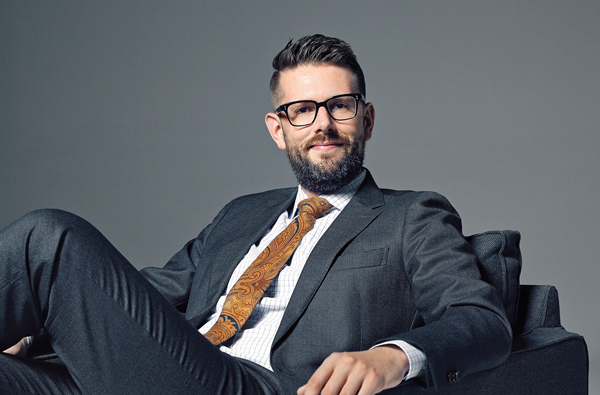Last February, early one Sunday afternoon, Ryan Edmonds walked into a boardroom on the 27th floor of the Bay Adelaide Centre. He had just learned from senior partners that Heenan Blaikie LLP, where he summered, articled and worked as an associate for two years, would collapse — three days before the firm publicly announced its dissolution on February 5. In the boardroom sat about 10 associates and partners from the labour and employment group.
Edmonds sat down at the table, and listened. The leaders of the labour group, Brian Burkett and Douglas Gilbert, said that Fasken Martineau DuMoulin LLP wanted to take on a significant group of Heenan Blaikie labour lawyers. They invited everyone in the room to join. And when Edmonds visited Faskens in person later that day, he learned he would pick up a 10 percent raise, plus structured bonuses, if he accepted the offer.
But as Edmonds looked around the room, he noticed that a certain group of lawyers was missing. As he saw it, the deal cut out some of the “service partners” — lawyers with “all the talent in the world” but who lacked a book of business. In one sense, he understood why: partners with fewer clients and big salaries are often the least profitable lawyers at a firm. But suddenly, that abstract principle became a reality.
Still sitting at that table, a specific service partner came to mind. “Everyone had been in her office at some point in their career,” he recalls. “She was a phenomenal lawyer, and so kind. And just because of the way Bay Street economics work, she was also too expensive.”
Edmonds started to examine his own career path. “I could see myself being on the treadmill for 10 to 15 years, grinding it out, propping up other people’s practices,” he says. “And then, suddenly, you’re nothing.” Moving to another national firm, even to make more money, seemed risky. As Edmonds puts it, “the curtain had been pulled back on Bay Street.”
Within days, he turned the offer down. (In the end, a coterie of 13 labour lawyers — six partners and seven associates — moved to Faskens.) Instead, he made a bold move: he launched his own firm and began to build a client base up from nothing, as Heenan Blaikie collapsed around him. “When people were packing up boxes and partners were fighting over files in the hallways, I was plotting out my website.”
“People were shocked,” says Jeff Goodman, who mentored Edmonds at Heenan Blaikie before defecting to Hicks Morley LLP in late 2012. Those close to both Goodman and Edmonds, he says, knew the young lawyer had turned down a big offer from Faskens. “They just said, ‘Really? He’s going to walk away from that?’”
But as the shock wore off, Goodman began to appreciate that Edmonds just might have the legal bona fides to get his plan off the ground.
For one thing, Edmonds loves the law — a passion that sprouted in 2004, when he got a job as a legal assistant at the employment boutique now called Rubin Thomlinson LLP. He had moved back to Toronto, having dropped out of the University of Waterloo after two years. He left school for two main reasons. One, he studied English literature and “loathed” the work. And, more importantly, he decided during the end of high school to come out to his friends and family. As a gay kid who grew up in the ’90s, he feared rejection. “You internalize it and it eats away at you,” he explains. This huge decision, along with the transition to university, “made it hard to have any goals or focus.”
Once he started working, though, his personal life settled. And he found employment law fascinating. “All of the cases were personal stories,” he says. There might be a pregnant woman caught in the midst of corporate downsizing, or a transgender man who lost his job. He saw that employment lawyers got to know clients on a personal level. And he wanted to be one of those lawyers. “It’s humbling for me to think that his experience here would have had such an impact on him,” says Janice Rubin, partner at Rubin Thomlinson. “After so many years of law, it is one of the things I’m most proud of.”
Edmonds got to work. He re-enrolled at the University of Waterloo, this time in the philosophy department. He graduated in 2007 and, the next year, started classes at Osgoode Hall.
In 2010, Edmonds joined Heenan Blaikie as a summer student. “I knew I made the right choice,” he says. “Everyone there was as enthusiastic as I was about the law. They’re all law nerds.” He “took on a ridiculously huge amount of work” and most nights stayed at the office until 9 p.m. — a work ethic that remained when he returned to the firm as an articling student and then as an associate. He devoted himself to work, learning as much as he could, even helping to plan an OBA conference in 2013 on gender identity and expression in the workplace. Edmonds says that without his training at Heenan Blaikie, he wouldn’t have had the gumption to go solo.
Still, when Edmonds launched his own practice — called Ryan Edmonds Workplace Counsel — in March of this year, he knew he might fail. But the consequences of failure didn’t sound so bad. He had no mortgage. No children. And, his living costs were lower than ever: he’d just moved in with his partner, an optician he started dating just before articling. (“People talk about how Bay Street destroys relationships. We’ve been together not only through articling, but being a lawyer on Bay Street and the demise of my firm. So there is hope.”) He kept overhead low by working from home and surviving on his old 2007 MacBook with a busted fan “that whirred like a jet engine.”
Edmonds did not fail. He found work right away. First, a few former Heenan Blaikie clients sought him out after learning that, as a solo lawyer, Edmonds bills less than he did at Heenan. More powerful, though, has been his personal network. Once he announced the opening of his firm on Facebook, the referral floodgates opened. Since launching, he’s earned as much each month as he would have at Faskens — sometimes more. And recently, he took his practice back to a tower on Bay Street.
Even though Edmonds opted out of the Faskens deal, he praises Burkett and Gilbert for arranging it in the first place. Edmonds knows that they turned down more lucrative offers from other firms that wouldn’t create as many new positions as Faskens. “It’s very hard to move 35 labour lawyers to another firm, and so there are limitations to what you can achieve,” says Burkett of that time. “We were just trying to do the best we could.” That effort, says Edmonds, made a difference. “It was a significant lifeboat and kudos to Brian and Doug for doing it.”
But the collapse of Heenan Blaikie made one thing clear: self-reliance is the backbone of a legal career. “You have to have a book of business,” Edmonds concludes. “It doesn’t matter how strong the relationships are that you have with powerful people. At the end of the day, you can’t always rely on people who helped you in the past.”
 The lowdown
The lowdown
Year of call: 2012
Current position: Owner at Ryan Edmonds Workplace Counsel
Greatest extravagance: St. Agur blue cheese
If I weren’t a lawyer I’d be: A salesman
Favourite legal character: Judge Judy
Favourite item in my closet: Grey flannel suit
Most treasured possession: Heenan Blaikie-stamped litigation
bag. It’s vintage couture!
Photography by Rodrigo Daguerre


